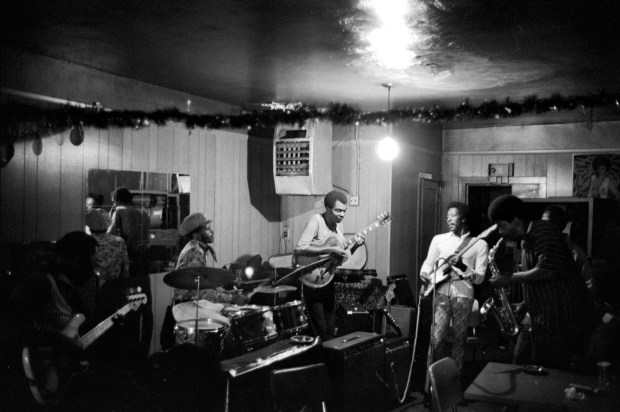Buddy Guy, who just turned 88, will be officially retired from the road by early fall. Only, before that happens, before the Chicago legend slows, a few facts demand context. For one, retirement doesn’t mean he’ll never play again. Just less often. Also, though his current tour is billed as his farewell to the touring life, he could tour again. Who knows? Depends on how he feels. Bluesmen, those around him like to repeat, never really retire. They just don’t do sound-check anymore.
Guy does not do a sound-check anymore. His guitar tech does it. These days he arrives at a venue and does not hang around. When home in Illinois, he’s eager to get back to his 14 acres in Orland Park. The older he’s become, the more naturally impatient he’s become, albeit paired with a twinkly smile. When a show is over, he walks from the stage to a waiting car and leaves. He will not talk much on a show day. He doesn’t want to risk his voice. Besides, he knows — everyone who knows him knows — he can talk.
The morning after he headlined the Chicago Blues Festival earlier this summer, he woke at 3:30 a.m. and was at Legends, his South Loop blues club, by 9 a.m., already talking. When he talks about himself, he says he grew up on a farm, where his habits were set.
He’s a believer in old habits, and a vessel of tales retold.
“You know I have been living out here in Chicago for 67 years now,” he said, sort of asking, sort of telling. “But on a farm see, you rise with the sun. We didn’t have a clock. The sun came down, you went home. The sun rose, you were out there in the field. You know, I have been trying to break that habit since I moved here? Doesn’t matter how late I get home from a show, I know I will be up, like, three, four o’clock in the morning.”
He remembers everything.
He’s told his band to warn him if he is ever about to play a song he played 10 minutes earlier. He fears this. He’s heard the stories about his friend B.B. King, how before King died nine years ago he’d play “You Are My Sunshine” five times in a single concert, the band unwilling to correct the boss. That is not Buddy Guy. He remembers the cost of a drink 60 years ago, the color of a guitar 70 years ago, the rhythms of a night in his 20s.
“Some stuff follows me my whole life,” he said.
George “Buddy” Guy, who arrived in Chicago near the end of the Great Migration. Buddy Guy, who became one of Chicago’s great bluesmen, and one of the greatest guitarists ever. Buddy Guy, keeper of an American art form, the music from which all American music flows. Buddy Guy, a one-man chamber of commerce and embodiment of the blues. Buddy Guy, still in the business of playing the Legend Buddy Guy. Buddy Guy, a living storybook to reread once again — a Midwestern life of such cultural consequence and ingrained mythology, it begs a little clarity.
He was born July 30, 1936, in rural Louisiana, and grew up on a farm. He made $2.50 for every 100 pounds of cotton that he picked. He left home at 21 and came to Chicago on Sept. 25, 1957 — which is his other birthday, he likes to tell people. He’s made 19 records under his own name and many others with friends and collaborators. He’s won eight Grammys, and he never took a single guitar lesson.
In fact, he made his first guitar.
But depending on who’s telling that tale, as a child, he made the guitar out of rubber bands or wood or his mother’s hairpins. When I asked about that guitar, he replied: “OK, in the South, we got mosquitos that will take you out of bed! I used to go fishing, they suck your blood, you hit them and the blood runs. We had this chemical to use on them and when the can was empty, it was like an old cigar box. I’d seen a guitar in a magazine I couldn’t afford, so I took two tacks and made a little guitar neck with wire screen wires. Which you could never finger like a guitar. The strings would break. First time I learned to play a real guitar, I walked three miles playing, just for someone to see me. I saw a cousin. I yelled ‘Look at this!’ He said, ‘You got it!’ I said, ‘Don’t stop me or I’ll lose it!’”
His stories start one place and end elsewhere. He can sound so apocryphal at times. Even his son Greg Guy said: “All of them stories of his, I was in doubt myself, but they’re real.”
He bunches up stray facts as if not to waste time. He prefers to condense. On the other hand, he also doesn’t want to be rushed. Not long ago, at a show with the Foo Fighters and other bands, he was performing on a stage that rotated so each act could be cycled on and off stage quickly, but when the stage began rotating to signal the end of his set, Guy stepped off of the disc and continued to play on the non-rotating part. He’s still full of fight and contradiction. One reason he created the Checkerboard Lounge, his famed, long-gone South Side club, was to tour less and spend more time at home with his kids. And that was 50 years ago — as late as 2022, he was still averaging about 130 concerts a year. Everyone who knows him knows he can’t stop, won’t stop. He slips into conversation that he’s never been the equal of the greats who inspired him, those names you know even if you don’t listen to the blues — Muddy Waters, Howlin’ Wolf. He says this minutes before a show. He says that he’ll try his best but who knows if it’ll be any good. Then within seconds, he’s killing, aiming his guitar neck into his audience.
Like a flamethrower, Carlos Santana described it.
Guy is a Chicagoan via Louisiana, a mash of the Delta branch of the blues and the urban blues pioneered in Illinois. He’s an upholder of tradition whose hook became unpredictability. He might wander off a stage and into bathrooms, playing guitar. He still wanders off the stage at nearly every show, still playing. I asked about this. He said:
“When I don’t do that, somebody will say you must not be feeling good. I got that from the late Guitar Slim in Louisiana. He’d play in Baton Rouge, where I’d moved. Clubs wouldn’t let bands play then until they sold a lot of whiskey. If a band started, they didn’t sell no more, people too busy watching. So they’d tell Slim, ‘Wait another 45 minutes.’ Anyway I’m in front of the stage and his band plays two numbers, then ‘Ladies and gentleman, Guitar Slim!’ But I don’t see nobody. They’re full of (expletive), I think. Then this heavy guy walks in the club holding Slim on his shoulders, like a baby in the park. Slim had this 150-foot cord, red and white hair. He was brought to the stage, climbed off those shoulders then started singing: The things I used to do… House goes crazy. I said to myself if I ever learn the guitar, I want to play like B.B. but act like Slim. When I first got to Chicago, blues guys sat in chairs on stage! Muddy’d be in a chair, like you to me.”
Nobody’d fault him for sitting at 88.
“Yeah, but look — his last years, B.B. sat in a chair. Big airports, I get a wheelchair now. But I’m not happy sitting down. My family was Baptist, and if you get happy, you shout, you get up. That’s what I thought I could bring to blues. The little tricks do get attention.”
That unpredictability is more predictable these days. Guy at 88 has become a comforting figure for those who worry about the future of the blues; he’s arguably the last thread connecting Chicago to the first generation of greats, coming out of the rural Southern poverty that defined early blues. And yet he’s also long past wanting for much. That’s the irony of having a legacy: You’re expected to represent the past even when you’re not that person anymore. Writer Albert Murray once decried American’s understanding of the blues as a “simpleminded expression of frustration and despair,” loved less for its art and craft and sound than as a kind of “therapeutic compensation” for being Black in America. Guy’s last 30 years have played like a period to that thought, brushing off decades of neglect and embracing the joy of the music, not only the pain.
Guy says if he had to start again, he’d do nothing different. It worked, after all. He got a National Medal of Arts from George W. Bush, Kennedy Center Honors from Barack Obama and was inducted into the Rock & Roll Hall of Fame by one of his inspirations (B.B. King) and one of his acolytes (Eric Clapton). He has more keys to more cities than he remembers, and his assistant, Annie Lawlor, jokes she’s lost track of all the mayoral proclamations declaring Buddy Guy Day.
But even Buddy Guy knows to stop, or semi-stop.
“The average person expects you still give them what you gave as a 20- or 30-year-old. The truth is, I might try, but it’s getting harder when you’re damned closer to 100.”
By the time Buddy Guy took the stage at Blues Fest, Millennium Park was past capacity. People were being turned away. Backstage, in the bowels of Pritzker Pavilion, musicians heard about fans jumping fences to get in. They shook heads, flattered to hear the excitement for a free annual festival, but keenly aware a lot of that excitement was for Guy: He was history, and, everyone heard, he was going away. Backstage was hectic, loud, like an airport terminal where everyone’s hauling guitars. Except for where Guy waited. He sat in the corner of a couch in his dressing room, flanked by water and chips, surrounded by his children and nephews and their children. Occasionally, a cheer from the huge crowd would penetrate this bunker and Guy would look up, impressed.
“Everyone keeps asking how I’m doing,” he said. “As if I have a choice but play! What’s 88 minus 6? I’ve been working, uh … 82 years. I’m going to try and enjoy what’s left.”
His voice was dreamy and serious, his face taking in family and friends. Blues guitarist Ronnie Brooks, son of the late Lonnie Brooks, an old friend of Guy’s, told me: “Buddy has been taken advantage of a lot. He told me about early days, like spending his last dime to get to a gig, a packed house, energy flowing, then at the end of the night, club owner tells him they didn’t make any money. ‘What you mean, the place was packed?‘ So this owner pulls a gun and says, ‘I said we didn’t make any money.’ I remember one show I played with him: Me and my band got paid, Buddy did not. He took it in stride.”
Guy’s story is so epic and archetypal that it even gets a lost-in-the-wilderness chapter. Soon after he arrived in Chicago in 1957, having few prospects, he walked the South Side for three days with nowhere to go, nowhere to play, ready to call his father in Louisiana and ask for a train ticket home — but then he noticed playing on a corner and was taken to the 708 Club on 47th Street, where he was introduced to a new mentor, Muddy Waters. Tom Hambridge, Guy’s producer and drummer, said: “After you’ve spent so much of your life not being paid what you were worth, even at 88 I bet it’s hard to turn any shows down.”
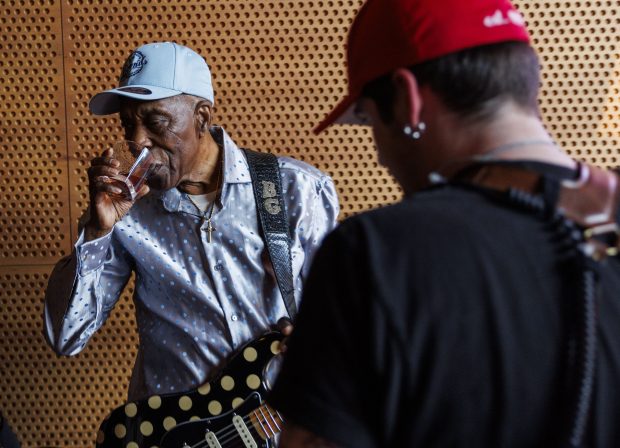
Guy leaves his dressing room just before he goes on. He walks slowly to the wings of the pavilion, where he receives a small burst of applause from friends. He does a shot of cognac with Clinée Hedspeth, commissioner of the Department of Culture Affairs and Special Events. He does a shot of cognac at every show; that’s his only real indulgence.
He’s fitted with his 1989 Fender, waits to be called, then, with a cocked head, strolls out.
First thing you notice when he opens his mouth is that his singing voice doesn’t fit his frame anymore. Guy is slender now, with a frail appearance that comes with age, yet his voice is big, strong, powerful. He thrusts his hips. He taps his guitar with drumsticks. He works through his own songs and a history of blues tropes, pausing to nod to the British and American superstars of the 1960s who lifted liberally from his style, quoting Cream, Hendrix. He plays at extremes, going quiet to loud abruptly, slow to fast, vice versa. When the time arrives, he wanders off stage.
Connor Korte, his guitar tech, looks alarmed.
This can be like taking care of a grandfather, Korte says later. Guy is swallowed by a crush that’s larger than usual, then despite his playing guitar the entire time he’s off the stage, despite the fact that he’s working, people do what they always do: They pat him on the shoulders, ask to shake his hands, attempt to have conversations with him, then and there. A child blows bubbles in his face. Guy avoids bare hands — “Did you know some people don’t wash their hands?” he asked me — but it’s impossible. If his guitar is knocked out of tune during a crowd walk, Guy tells Korte: Well, that’s part of a live show, that’s real, and if it happens, he’d doing something right.
The irony is that the only time he’s been fired, Guy said later, was when he first played live. “I could sing but didn’t think I was good enough, so I’d turn my back. This guy at the club in Baton Rouge, says I got to turn. I can’t. I start crying. I’m fired. A friend of mine said, ‘Let me show you something.’ He gives me schoolboy scotch. Which to us was just wine, and not that gentle wine. ‘Drink two shots, you’ll turn around!’ Sure enough, I did.”
Regardless of his schtick now, he still lacks an ego on stage. At Blues Fest, the closing jam goes on so long that when Guy wanders quietly off the stage, it’s unclear if he’s returning. He is not. The band continues but he’s already in a freight elevator. The gate rolls down, large metal doors clang in the middle, and Buddy Guy has left the building.
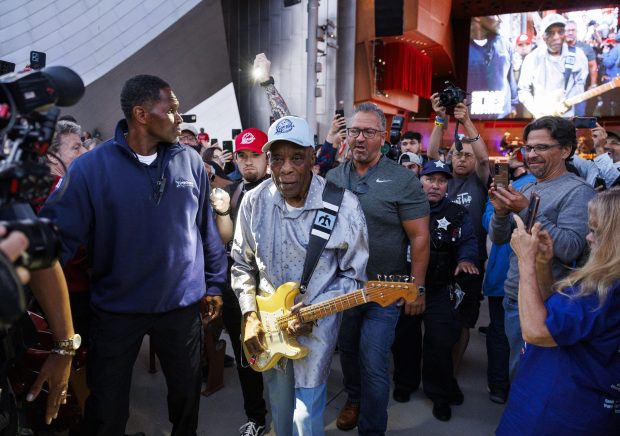
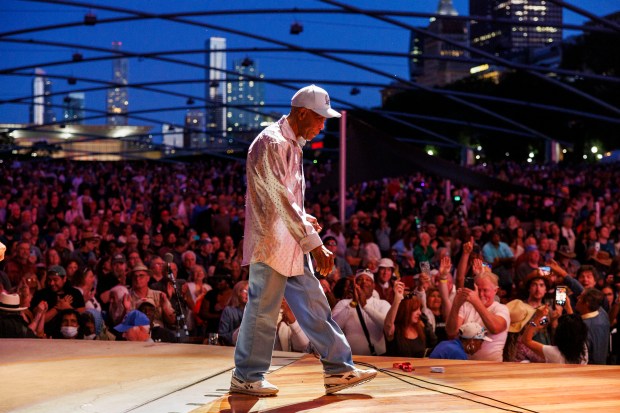
The next morning, at his club, I brought him croissants. He told me not to feed a hunting dog that hasn’t hunted yet: “No — you’re going to make me lazy.” Outside, commuters hustled past and tourists walked over from hotels to snap a photo of Legends. He left the Checkerboard Lounge in 1985 after 13 years. It never made money, he said. When Legends opened in 1989, he wanted to be near tourists and hotels. He doesn’t look like an aging bluesman on a Monday morning. He wore jeans and Dr. Martens. Despite playing an unannounced post-Blues Fest show here hours before, he looked rested. He’s handsome, like an aging actor; indeed, though details aren’t announced, he just shot a small role in a big upcoming vampire movie.
“People will tell you what’s good for you and what ain’t good for you.” He sighs. “We had mules on the farm, not machinery. Two years after I moved here I went home and the mule that used to pull my plow, that mule was dead. The one that didn’t plow, he was looking at me over the fence, like ‘Hey man!…’ Still alive. A few years ago my doctor put me on a tread machine, wired me up. Stress test. I didn’t say nothing until he finished. Then I said I taught my dad to drive, we walked everywhere, we couldn’t afford a car. It’d be 119 degrees and dad walked sunup to sundown. I told that doctor, my dad died at 56, what good did walking do for him? Doctor just smiled.”
Somehow that story segued into food, his favorite subject.
He cooks constantly. He just learned you can ask for fresh chicken at Popeyes, but you might wait a while. He bemoans at the quality of corned beef these days. On the family farm, he ate something other than chicken once a year — a freshly butchered ham at Christmas. His parents were sharecroppers; half of what the family made pulling cotton went to the other family that actually owned the land. The town was Lettsworth, though town is pushing it: Lettsworth, to this day, remains unincorporated Louisiana. Then, they had no irrigation, electricity, plumbing and for a while, no radio. The nearest neighbor was a mile away. “But the moon could shine there! The moon, the stars. They got something called the Dipper. Ever seen it? Me, I saw it every night.”
He left Louisiana at 21, hoping to meet Muddy Waters and start a life. That felt like one and the same. He tiptoed through the blues clubs of the South and West Sides. Legends, Guy notes, is “like 90% white, but when I got to Chicago, the clubs were 90% Black.” There was Theresa Needham of Theresa’s Lounge on South Indiana Avenue who’d meet you at the door wearing an apron and holding a blackjack and a gun. “And there was the Squeeze, which people called the Bucket of Blood because of all the people killed in it. I worked there six months. These places were packed night and morning. You know the guy who came in on a morning? The guy who started work at midnight. You couldn’t get into clubs on a Monday morning. Too crowded.”
He shared stages with so many blues legends in those first years — usually backing them on guitar — Chicago’s major blues label, Chess Records, brought him in to back those artists on vinyl. But Chess didn’t like the volume or distortion of Guy’s guitar. “He confounded Chess,” said Bruce Iglauer, founder of the Chicago-based label Alligator Records. “Musicians were playing short, restrained solos then. Buddy was ahead of his time, overbending strings, and doing solos lengthier and more frantic than Chess knew.” By then, though, Guy was used to seeing how badly even popular bluesmen were treated. When he first arrived in Chicago he assumed the ones he revered were wealthy. Until he found himself buying them drinks with his last $300. When he brought his best songs to Chess, Guy said they would hand them to more established Chess artists and change the song credit. “We were getting ripped off. But look, Muddy, Wolf, B.B., they didn’t have high school. I went to school in a church. Once you learn to write your name, time to work.”
Guy didn’t even make it into this newspaper until he’d been in Chicago nine years, and even then it was to note he was backing up his partner, harmonica player Junior Wells. (They “need many more hours of practice,” the critic wrote.) For years, they were joined at the hip, but Wells was the star. Says Ronnie Brooks: “They were confident and talented, and they would squabble on stage. But nobody got between them. They were like the real Blues Brothers, man. You could feel it.”
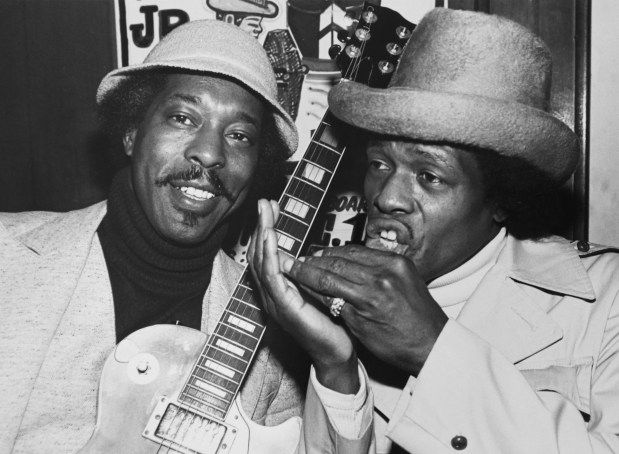
For the first part of the 20th century, blues were a Black tradition, Black musicians, Black audiences. But by the 1960s, as its popularity began to wane, white British acts — Clapton, Rolling Stones, Jeff Beck — were name-checking influences: Howlin’ Wolf, Willie Dixon, Muddy Waters and, for his guitar style, Buddy Guy. Chess started to get requests for whomever was playing on such-and-such’s record. After that, Guy and Wells toured with rock bands, often for audiences expecting tired elderly Black men, not young men in tailored suits.
Guy stayed on the road so much that his son Greg Guy remembers the Fourth of July in the 1980s when he was home. “We had a party and DJ and this music comes on so I ran to the DJ, took that record. I flew it like a Frisbee. I turn around. Dad’s there. ‘What happened to the music?’ DJ said this kid pulled it off. I was 10. I didn’t know that was my dad on that record — I thought it was old people’s music. I said I wanted to hear Prince.” Guy wasn’t financially sound until his late 50s, after he opened Legends and won eight Grammys and sold some records. He’d already been married (and divorced) twice and had eight children. “When I first toured with him in the late ‘90s, he’d be in the news, on Letterman, Clapton would be talking about him all the time,” said singer Shemekia Copeland, whose father, Johnny Copeland, was close to Guy. “He was like proof that if you’re healthy and live long enough in this, you might get the success you deserve.”
Late in July, Legends had an 88th birthday party for the owner. Guy sat where he always sits, on a stool by the front door. Friends, musicians and family circled by, congratulating. His first wife came by. Tourists gawked and snapped pictures; Guy, beneath a pandemic mask, stared past them to the stage. Sometimes a stranger would seem too eager to get close and his security man, wearing a straw cowboy hat, would step in, his palm out, arm’s length. If Legends is something of a museum of the blues, Guy is its showpiece, too alive to risk.
But surviving isn’t thriving.
Guy laments this. When he tells stories, more often than not, he tacks “the late” onto friend’s names. The club will continue; Guy will probably keep playing his annual residency shows each winter. But he has a new album coming in six months and the only place he really sells records anymore, he said, is the gift shop at Legends. Art forms do fade. Genres do die. Guy often mentions Muddy at the end, asking him not to let the blues die. But Guy worries the blues may die. Chicago bluesman Mike Wheeler, whose band played the birthday party, told me “when I was a teenager, kids my age didn’t want anything to do with this music.” He knew the blues because his parents played them. Dan Souvigny, who plays keyboards for Guy, is 24; again, he knows the music from his parents’ records. If your picture of the blues looks like Muddy Waters, the future is dim.
But that’s one future.
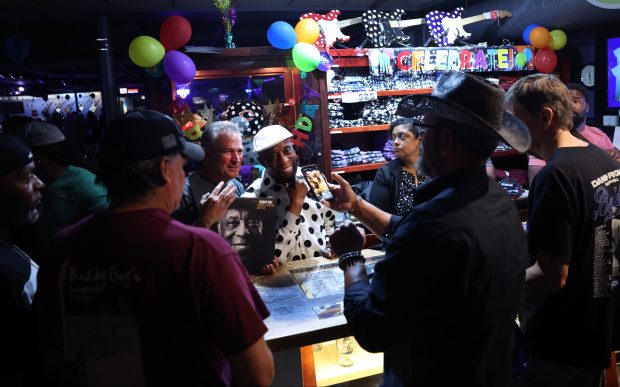
Carlos Tortolero, director of Chicago Blues Festival, said: “Everything changes. Will blues go away? No. Will it be the same? Of course not.” Beyoncé plays the blues. Erykah Badu. Jack White. Melody Angel, a young Chicago singer whose music skirts the blues, said: “When the blues got going, it was made up then evolved. That’s why there’s Chicago blues, Memphis blues. It’s evolving, and that’s how I see it continuing. To older fans, it might not sound the same, but it’s not supposed to. You can’t expect it to. To expect that is to say younger artists just have to sound like Muddy and Buddy. But we can learn from them.” Iglauer of Alligator Records tells young blues acts these days that they should sing: “I woke up this morning and my hard drive crashed.”
What Buddy Guy represents, that’s fading, if slowly. Even one of the bumper stickers in the gift shop comes across melancholy: “As far as I can tell, the blues is alive and well.”
So let us now praise famous bluesmen.
By the end of his birthday, most of his family, who run the club, were on stage, jamming. There were cupcakes and more shots of cognac, and words of love. Guy even sang a little, about steel mills and women who’ve kicked him out and not having a friend in the world. He sang the blues.
“Have you ever felt mistreated?” he sang.
Oh yeah, shouted tourists.
“You know the (expletive) what I’m talking about?” he sang.
They did, they promised.
cborrelli@chicagotribune.com


